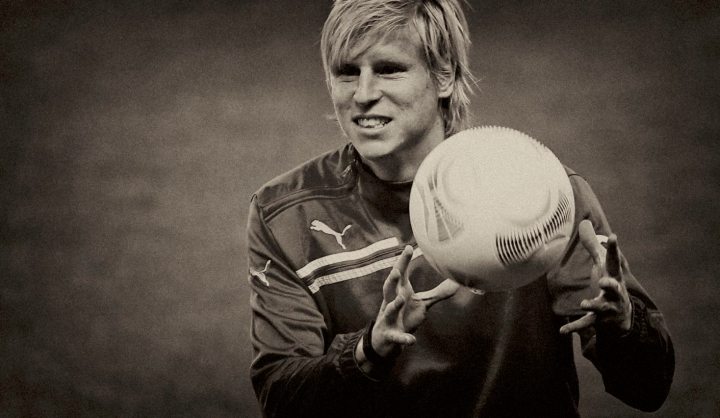Maverick Life, Sport
Depression and Sport: Frantisek Rajtoral and the black dog that’s become an elephant

A week ago, professional footballer Frantisek Rajtoral became another preventable statistic. The black dog that bites has become a rampaging elephant. It's about time we tame it. By ANTOINETTE MULLER.
It’s been more than a week since Frantisek Rajtoral, a 31-year-old Czech international footballer, was found dead at his home in Turkey.
Rajtoral was ill, but not in the way you’d immediately think when somebody tells you they are unwell. In fact, Rajtoral’s silent disease was so adept at hiding in plain sight that Gaziantepspor’s president (the club he was playing for), Ibrahim Kizil said, said that “they were not aware of any problems”.
The 31-year-old was one of hundreds of thousands of people – perhaps even more because of the stigma attached to dying this way – who died by taking their own life. His story is tragically common, but it should not be.
There will – and has been – some dissection in the wake of Rajtoral’s death about how sport deals with professionals who are struggling. Broadly, the feeling is that it doesn’t. While improvements have been made, the stigma is still strong and the duty of care post-playing is, in some cases, non-existent.
A study from 2013 by Vincent Gouttebarge, a former French professional who now works as the chief officer for the international players’ union, found that more than 10% of professional footballers die by their own hand. More than 80% of these incidents happen before a player turns 45. Other studies say that once a player retires, their risk of depression leaps to 40%.
Leeds, QPR and Blackburn defender Clarke Carlisle, who himself suffered from depression and tried to take his own life, has become a champion for the cause in the United Kingdom, but globally – and outside of sport – the issue remains critical.
More than we would like to believe, sport is a mirror for society, and the way in which sport deals with mental health is evidence of that.
Mental health is an infinitely complex tapestry to navigate, but to start the conversation could not be simpler. If somebody has blood gushing from their head, their arm in a sling, their leg in a cast, our response to them is “get well”.
Why then, when somebody tells of their mental injuries, do so many of us feel the need to say “toughen up” instead of “get well”?
And, despite the (mis)conceptions we have about how a professional sports person should feel, surrounded by all their privilege, we do not tell people they “have no reason to get cancer” just because they’re earning big bucks at elite level. Why do we feel they should be immune to a mental injury?
Mental illness – in all its various forms – does not care who you are and the circumstances around what leads to that point of complete hopelessness is irrelevant. It’s not one thing. It’s not one person. In fact, it’s never really a thing at all. It’s an illness that often has a terminal prognosis if it is not treated.
It is no longer a black dog. It’s a rampaging elephant that nobody wants to take by the trunk and say, “This is my elephant”.
The World Health Organisation claims that suicide accounted for 1.4% of all deaths worldwide in 2015, making it the 17th leading cause of death.
The statistics are scary, solemn, but entirely preventable.
So, teams cannot shrug and say they do not know. They cannot shrug and say they did not know what to do. That they did not have the resources. That it was taboo. They cannot say that this only happens to a few.
They know, because Gary Speed told them. Robert Enke told them. Andreas Biermann told them. Dan Vickerman told them. Justin Fashanu, Dave Clement, Yiannis Koskiniatis, Dale Roberts, Alan Davies and every single other person on this planet who has ever felt so desperately lost, alone and frightened that they ended their own life, told them.
But they told us, too. This is not sport’s problem alone. It’s society’s. And it’s about time we make it our collective responsibility to reach out and do what we can. It doesn’t take much. A considered “I’m here” or a kind “get well soon” can make the world of difference. But long-term care is critical, too, and that’s where the biggest problem lies globally and in South Africa.
Like malaria, like HIV/Aids, like cancer, like any other disease which is no longer seen as a death sentence, depression needs to be treated in the same way. And while some countries do better than others, we should hold those where we are failing to account.
The problem is global and transgresses all lines. It does not pick its victims based on demographics, and treatment should not be exclusive either.
This is a stark reminder for South Africa which ranks as one of the worst countries in the world for provision of mental health treatment. It’s a failure of human rights. And we should all be ashamed. DM
Get help
If you or someone you know is struggling with mental health, contact the Suicide Crisis Helpline at 0800 567 567 or SMS 31393. The 24-hour helpline can be reached at 0800 12 13 14.
Photo: Viktoria Plzen’s midfielder Frantisek Rajtoral during a training session at Vicente Calderon Stadium in Madrid, central Spain, 03 October 2012. Rajtoral, playing for Turkish club Gaziantepspor, was found dead in his home at Gaziantep on 23 April 2017, as media reports. They also reported that local authorities announced that Rajtoral had committed suicide. EPA/JuanJo Martin




















